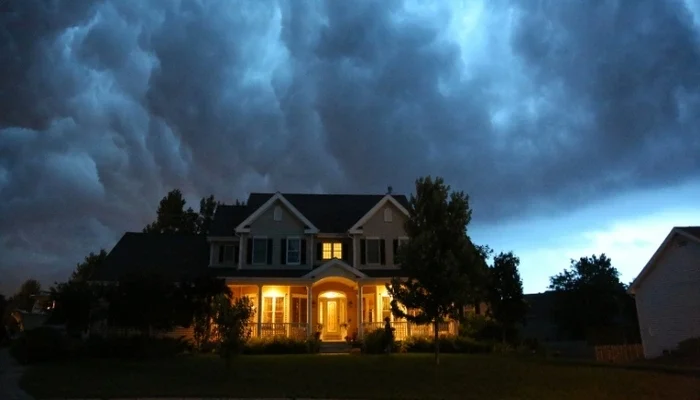As storm season approaches, many homeowners begin to think about how to best protect their property from the potential damage that severe weather can bring. Strong winds, heavy rain, and flooding can all wreak havoc on homes, causing structural damage and putting both property and occupants at risk. Proper preparation before a storm hits can help minimize damage and keep your home and loved ones safe.
Here are some key steps to help you prepare your home for storm season, including safeguarding your property from water damage, securing vulnerable areas, and ensuring your family is ready for emergencies.
1. Inspect and Maintain Your Roof
Your roof is your home’s first line of defense against storms, so it’s essential to ensure that it’s in good condition before storm season begins. Start by checking for any loose or missing shingles and repairing them as needed. Look for signs of wear or damage, such as cracks or leaks, which could allow water to enter your home during a heavy rainstorm.
If you have a flat roof, clear any debris that might have accumulated, as this can obstruct drainage and lead to pooling water. Regular roof maintenance can help prevent costly repairs and reduce the risk of serious damage during a storm.
2. Clean Gutters and Downspouts
Clogged gutters can cause water to back up and overflow, leading to water damage in your home’s foundation, walls, and roof. Before storm season, take the time to clean out your gutters and downspouts, removing leaves, twigs, and other debris that may have built up over time.
Ensure that your gutters are securely attached to the house and check that the downspouts are directing water at least several feet away from your home’s foundation. This simple task can help prevent flooding in your basement or crawlspace and protect your home from costly repairs. If you’re unsure about doing this yourself, consider hiring a professional to ensure everything is in proper working order.
3. Trim Trees and Remove Dead Branches
Strong winds during a storm can turn loose branches into dangerous projectiles, potentially causing significant damage to your home, vehicles, or even power lines. To minimize this risk, inspect the trees around your property and trim any branches that are hanging too close to your home or could break off in high winds.
Also, consider removing any dead or diseased trees that are at risk of falling. Even if they seem sturdy, weakened trees can topple over during a storm, causing damage to anything in their path. Keeping your yard well-maintained can help protect your home from storm-related debris and reduce the risk of personal injury or property damage.
4. Install Storm Shutters or Reinforce Windows
Windows are particularly vulnerable during storms, especially when high winds or flying debris are involved. Storm shutters are one of the best ways to keep your windows safe. These can provide an added layer of protection and help prevent glass breakage.
If storm shutters aren’t an option, consider reinforcing your windows with impact-resistant glass or using plywood as a temporary solution in the event of an impending storm. Additionally, inspect window seals to ensure there are no gaps or cracks that could let in water during heavy rain.
5. Secure Outdoor Furniture and Equipment
During a storm, outdoor furniture, grills, and other yard equipment can become airborne and cause damage to your home or your neighbors’ property. Before storm season, take the time to secure or store these items in a garage or shed to prevent them from being tossed around by strong winds.
For items that can’t be easily moved, such as swing sets or garden sheds, make sure they are securely anchored to the ground. You may also want to secure or cover any outdoor HVAC units to prevent debris from causing damage to the system.
6. Check and Maintain Your Sump Pump
For homeowners with basements or crawl spaces, a functioning sump pump is vital for preventing water damage during heavy rainfall. Before storm season, test your sump pump to ensure it’s working properly and can handle an influx of water.
If your sump pump isn’t functioning correctly, have it repaired or replaced before the storm season arrives. Consider installing a backup pump or a battery backup system to keep your home protected in case of a power outage. This small investment can make a big difference in preventing flooding and water damage in your home.
7. Review Your Homeowner’s Insurance Policy
It’s always a good idea to review your homeowner’s insurance policy before storm season begins to ensure that you have adequate coverage for storm-related damage. Some policies may not cover flood damage, so you may want to consider adding flood insurance if you live in a high-risk area.
Understanding what your insurance covers and taking the time to document your home’s contents can make it easier to file a claim if your property is damaged in a storm. Having the proper coverage in place can provide peace of mind during storm season and ensure you’re prepared for any potential damage.
8. Prepare an Emergency Kit
In the event of a major storm, there’s always the possibility that you could lose power, be unable to leave your home, or even need to evacuate. Preparing an emergency kit with essential supplies can help you and your family stay safe and comfortable in the aftermath of a storm.
Your kit should include items like bottled water, non-perishable food, flashlights, batteries, a first aid kit, medications, and important documents. Be sure to have enough supplies for each family member to last at least 72 hours. It’s also a good idea to keep a backup power source, like a generator, on hand in case of prolonged power outages.
9. Work with Professional Restoration Companies
If your home sustains damage during a storm, it’s important to address the situation as quickly as possible to prevent further issues like mold growth or structural damage. Professional restoration companies, like the water damage pros, are trained to handle the cleanup and repair process efficiently and effectively.
Whether you’re dealing with water damage from heavy rain or flooding, professionals have the expertise and equipment to extract water, dry your home, and prevent further damage.
10. Stay Informed and Follow Weather Updates
Finally, staying informed about upcoming storms is one of the best ways to prepare your home and family. Sign up for weather alerts, follow local news, and make sure you have a plan in place for what to do if a storm is approaching.
By staying informed, you can give yourself enough time to implement the preparations mentioned above, secure your home, and ensure that your family is safe.
Conclusion
Preparing your home for storm season doesn’t have to be a daunting task. By taking proactive steps like inspecting your roof, cleaning your gutters, trimming trees, and securing outdoor furniture, you can significantly reduce the risk of storm-related damage. Additionally, having a plan in place, reviewing your insurance, and working with professionals like the water damage pros can help you recover more quickly if a storm does cause damage.
Remember, storm season is unpredictable, but with the right preparation, you can protect your home and loved ones from the worst of what nature has to offer.
Choice Home Warranty George Foreman in 2024










Comments